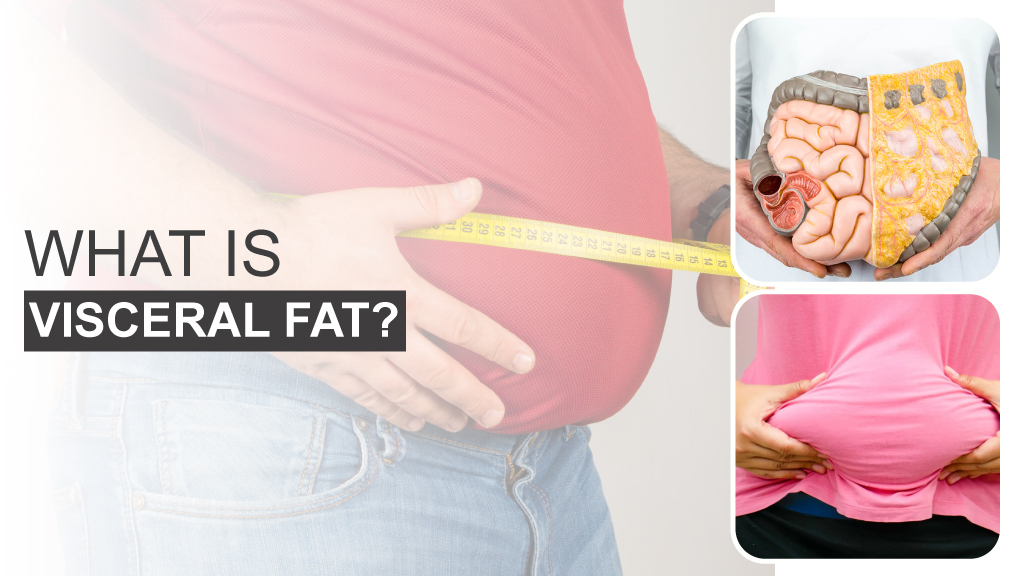Body fat or visceral fat is stored inside our abdominal cavity and around a number of vital internal organs like the liver, pancreas, and intestines. Because studies have demonstrated that visceral fat has a specific and potentially harmful role in how our hormones function, it is frequently referred to as “active fat.” Increased visceral fat storage is linked to an increased risk of a variety of health conditions, notably, type 2 Diabetes.
Visceral fat droops from the abdomen giving a person an ‘apple’ form. Visceral fat is more harmful than subcutaneous fat because it produces more poisonous chemicals. Visceral fat, even in slim persons, poses a number of health hazards. Men are more likely to have visceral fat than women.
What types of fat do we store?
Fat cells provide a purpose other than simply storing energy. Fats also produce hormones and inflammatory chemicals. Inflammatory indicators such as IL-6, IL-1, PAI-1, and TNF- are produced in greater abundance by visceral fat cells. These hormones can cause long-term fatigue and pain and increase the risk of chronic disease over time. Heart illness is the best example of this process. Plaque can accumulate inside the arteries as a result of long-term inflammation, which is a major risk factor for the heart. Plaque is a material made up of cholesterol as well as other substances. It expands over time and has the potential to rupture.
It is critical to understand the distinction between visceral and subcutaneous fat. The fat we store just beneath our skin is known as subcutaneous fat. Subcutaneous fat is the one that we can sense on our legs and arms. Both forms of fat can contribute to a developing belly. Subcutaneous fat is the fat we can feel just beneath the skin, but we may also be accumulating significant additional fat within our abdomen, where our organs are located. Our visceral fat is found within the abdominal cavity.
How to Get Rid of Visceral Fat?
- The ketogenic diet, which is extremely low in carbs, may also aid in reducing visceral fat. Ketogenic diets are low-carb diets that substitute carbohydrates with fat. This can cause you to enter a state of ketosis, a normal metabolic state. According to a study comprising 28 obese adults, those who adopted a ketogenic diet shed more fat, particularly visceral fat, than those who followed a low-fat diet. Visceral fat is the kind of work you do every day.
- Next is to increase your aerobic exercise as much as possible. Aerobic exercise on a regular basis is an excellent approach to losing visceral fat. Cardio is a type of exercise that burns a lot more calories. Many studies have demonstrated that aerobic exercise, even without dieting, can help you shed visceral fat. A review of 15 research involving 852 people, for example, assessed how well various forms of exercise lessen visceral fat without dieting. They discovered that aerobic activities of moderate and high intensity were the most efficient at lowering visceral fat without dieting. However, mixing cardio with a balanced diet seems to be more effective than just doing either one alone in reducing visceral fat. Start with two to three minutes of brisk walking, jogging, or running if you wish to get started with cardiovascular activity.
- Increase your protein intake an adequate amount. The most crucial component for fat loss is protein.
- Increased levels of the satiety hormones GLP-1, PYY, and cholecystokinin are produced when you eat more protein. It can help decrease ghrelin levels, which is a hunger hormone. Protein has also been found in studies to assist enhance your metabolism, which aids in losing weight and visceral adipose loss. Furthermore, several studies demonstrate that persons who consume more protein have less visceral fat. Greater protein intake was connected to a lower BMI, higher “good” HDL cholesterol, and lower waist size, which is a measure of visceral fat, in a study of 23,876 individuals. Add a source of protein to your diet to boost your protein intake.
- Consumption of added sugar should be kept to a minimum. Sugar that has been added is extremely unhealthy. It has no vitamins or minerals, and eating too much of it can make you gain weight. People who consume more added sugar have higher visceral fat, according to studies. Fructose is processed by the liver and makes up around half of the added sugar. Fructose can be converted to adipose by the liver in excessive concentrations. This could lead to an increase in visceral fat storage. As a result, consuming less sugar added and fructose could help you shed visceral fat. Simply eating mostly whole foods like fresh veggies, fruits, lean meats, and fish will help you cut down on your added sugar intake.
Visceral fat and insulin resistance
Insulin resistance which can contribute to glucose intolerance as well as type 2 Diabetes, is known to be linked to having a lot of visceral fat. Researchers discovered that visceral secretes retinol-binding protein 4 (RBP4), a protein that has been linked to insulin resistance.
How can I tell if I have too much visceral fat?
An MRI scan is the most reliable approach to determine if you have extra visceral fat. However, because MRI scans are a costly process, they are not suggested as a method for detecting diabetes risk. Taking a waist measurement is a relatively effective indicator of visceral fat. According to Harvard University, roughly 10 per cent of our total fat intake is likely to be stored as visceral fat, if you have more body fat than is suggested; you are more likely to have more visceral fat stored than is healthy.
Why would the body accumulate fat around organs?
Scientists are attempting to determine why the body stores visceral fat. Stress has been shown to have a substantial impact on where fat is deposited in our bodies. Cortisol, a stress hormone, has been discovered to greatly promote the accumulation of visceral fat, according to research.
Cortisol, a stress hormone, has been discovered to greatly promote the accumulation of visceral fat, according to research.
How can I keep fat from accumulating around my organs?
Don’t get discouraged if your food and exercise aren’t helping you lose weight as quickly as you would want; your hard work may be paying off in the form of unnoticed benefits. Do the following steps:
• Exercise on a regular basis
• Consume a nutritious, well-balanced diet.
• Make sure you receive a decent night’s sleep on a regular basis.
• Reduce your stress level
• Limit your alcohol consumption.
• Quit Smoking
Liposuction only burns subcutaneous fat, so it’s not a good idea to use it to improve your health. Liposuction, like any other type of surgery, carries the danger of infection, which can be harmful to our health.

